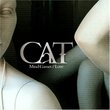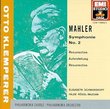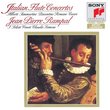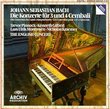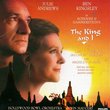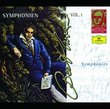| All Artists: Gioachino Rossini, Riccardo Chailly, Luciano Pavarotti, Mirella Freni, Sherrill Milnes, Nicolai Ghiaurov, Della Jones, Elizabeth Connell, Richard van Allan, National Philharmonic Orchestra Title: Rossini - Guglielmo Tell (William Tell) / Milnes, Pavarotti, Freni, Ghiaurov, D. Jones, E. Connell, van Allan, NPO, Chailly Members Wishing: 0 Total Copies: 0 Label: Decca Release Date: 10/25/1990 Genre: Classical Style: Opera & Classical Vocal Number of Discs: 4 SwapaCD Credits: 4 UPC: 028941715425 |
Search - Gioachino Rossini, Riccardo Chailly, Luciano Pavarotti :: Rossini - Guglielmo Tell (William Tell) / Milnes, Pavarotti, Freni, Ghiaurov, D. Jones, E. Connell, van Allan, NPO, Chailly
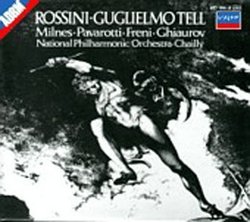 | Gioachino Rossini, Riccardo Chailly, Luciano Pavarotti Rossini - Guglielmo Tell (William Tell) / Milnes, Pavarotti, Freni, Ghiaurov, D. Jones, E. Connell, van Allan, NPO, Chailly Genre: Classical
William Tell, best known for its overture, which was used as the Lone Ranger's theme song, was Rossini's final opera, and a magnificent, four-hour singfest it is. Tell is a baritone role, handsomely sung here by Sherrill M... more » |
Larger Image |
CD DetailsSynopsis
Amazon.com essential recording William Tell, best known for its overture, which was used as the Lone Ranger's theme song, was Rossini's final opera, and a magnificent, four-hour singfest it is. Tell is a baritone role, handsomely sung here by Sherrill Milnes, and the heroine is Matilde, who, as performed by Mirella Freni, has every bel canto trick in her repertoire and keeps her cool even during some wickedly fast and high music. But the most challenging role--and the reason the opera is rarely performed--is for the tenor, Arnold, who must sing 2 high C-sharps, 28 high Cs, and an undisclosed number of Bs and B-flats. And the role is as long and expressive as it is high. This is, arguably, Pavarotti's greatest perfomance on discs (he once said it was his best recording) and is a must for all opera lovers to boot. --Robert Levine Similar CDs
Similarly Requested CDs |
CD ReviewsA Lively Tell for Those Who Have Other Recordings of it: Jeffrey Harris | Seattle, WA USA | 04/24/2002 (3 out of 5 stars) "William Tell is Rossini's last opera, and this Romantic heroic interpretation of Schiller's epic of Wilhelm Tell among his best works. Rossini composed this opera in Paris. The original libretto was written in French, for a French audience, chorus. Parisians by reputation had more refined musical technique and tastes than their Italian counterparts and Rossini applied the best of Italian opera technique, which he had mastered and more refined and complex French musical staging which he studied and adapted during his years in Paris. One problem with this interpretation is that the text is in Italian, not in French. The crisp staccato sounds of Italian don't match the music as well as the smoother sounds of French do. The bond between language and music seems especially significant for Rossini's opera because he wrote his score to fit with words, leaving little room anywhere for improvisation by the singers or added or subtracted sounds or syllables by translators. Riccardo Chailly's interpretation of this music is fresh and lively, if inconsistent in places. It's a pleasure to listen to this if you want a fresh take on Rossini. The star studded cast, not all in their prime, follow the conductors lead with honest, innovative performances and adept singing. If you want a stronger, perhaps more authentic grasp of the music and the story in Italian, Philips issued a recording of Riccardo Muti conducting a first rate ensemble performance in Italian at la Scala. If don't already have Guillaume Tell in French, its original language, and want a more definitive version before trying the more experimental, please consider EMI Classics' edition conducted by Lamberto Gardelli also with a first rate ensemble cast." A monumental performance of Rossini's final Masterpiece! Rod Tierman | 05/03/2000 (5 out of 5 stars) "All four of the principals are marvelous in this, Rossini's final opera. Milnes is a very convincing Tell in this performance and is in magnificent voice (even interpolating a stupendous High A in his aria "Resta Immobile"), turning in a heartfelt performance indeed. Pavarotti was still riding the crest of his glorious prime when this recording was made and could still be justifiably dubbed "King of the High C's". His Arnoldo is both beautifully and excitingly sung. "O Muto Asil" and "Corriam, Vorriam" will literally have the listener riveted. The High C's and C sharps Pavarotti pulls off here are absolutely breathtaking. One can easily understand why he dubbed this his finest studio recorded performance and what all the fuss was about concerning this great Tenor. Mirella Freni is a very beautifully sung youthful sounding Mathilde. Ghiaurov's Kessler is appropriately evil sounding and the great Bulgarian Bass is in excellent voice here, but I do agree with a previous reviewer who stated that it sounds as if they recorded Ghiaurov in another room. Chailly's conducting on this recording is simply put, flawless. The sound on the recording is wonderful. This is definitely THE recording to own if one wants to hear what REAL vocal pyro-techniques are all about. This is the finest recording of Guigliemo Tell this reviewer has ever had the priveledge to hear. This performance should be an absolute MUST for every operaphile's collection. BUY THIS RECORDING! You will definitely be ecstatic that you did." A Must Have Recording Rod Tierman | 11/07/1999 (5 out of 5 stars) "You wouldn't think that Milnes would be a great Tell. The part is low and the singer is happiest on high. Yet Milnes is outstanding in this bass-baritone role. He has everything, a brilliant voice with superlative musicianship and emotional commitment. This recording will be his testament after his Verdi and Puccini roles have been eclipsed.Milnes is better than Bacquier who should have a better tessitura fit. In the theater you might like Zancanaro's voice better than Milnes' but on their respective records Milnes is clearly better. Milnes is even better than Giuseppi Teddei who is quite wonderful on the old Cetra recording.Pavarotti is at his peak. The part of Arnold is sometimes considered a killer part. Pavarotti makes it sound easy. No one else has the squillo and the beauty of tone in this part. Merritt is famous in this part and unlike Pavarotti actually does it in the theater but his real fach is in the Nozzari roles where he can show off his low notes. He simply is no match for Pavarotti in this part. Gedda has also recorded this role and of course he also sang it in the theater. Gedda's voice is somewhat higher than Pavarotti's but its a size smaller. Arnold is a heroic part unlike almost all the other Rossini tenor parts. Its more like Manrico. The classic Arnold was Esclais. More recently Fillipeschi was a famous Arnold. Pavarotti isn't a real heroic tenor but he is much smoother and more musical than either of those two estimable gentlemen. Freni is very fine - rather better than Studer who is also quite good. The best Mathilde I've ever heard was VanNess - but she hasn't recorded it. The sound of this set is spectacular and it isn't conducted by Muti - another plus.The famous basses however don't make much impression. Ghuarov is perhaps all round finest bass of the century but here he sounds ordinary. Tomlinson has maybe the biggest bass voice I've ever heard but the recording studio robs him of that distnction and reveals an ordinary timbre. Tozzi and Corena on Cetra shows that it it is possible for a bass to be memorable in this show.A special word must go to Suarez the fisherman. He of course has astounding high C's. He was the Arturo in San Francisco for Sill's last Puritani. He was a hoot. Everytime it went for a high note he would stop and point up at the roof. I wasn't there but apparently on oppening night without telling anyone he decided to attempt the 'Palermo E' - the famous E above high C that Rubini interpolated in Palermo. He missed. He let out a strangled gargle that rattled Sills who missed her entrance, the courus got off and the opera ended in a musical shambles. The opera world hasn't been seeing a lot of him lately. This recording is a wonderful momento of this unwise tenor. He was in a sense the tenor's tenor."
|

 Track Listings (14) - Disc #1
Track Listings (14) - Disc #1

